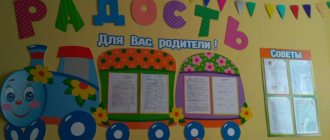Home EDUCATION… Preschool… Recommendations for childbirth…
Recommendations for parents on organizing play activities for a preschooler at home
“Playing with children develops the mind, mind, and soul!”
Every parent dreams of his child growing up smart, independent, and taking a worthy place in the life of society in the future.
The child does not show as much interest in any activity as in play. He is interested, which means that learning and development occurs easily and with pleasure. This is the secret of the educational potential of the game. And they are huge:
- Games develop the cognitive abilities of the individual - attention, memory, perception, thinking, imagination, train observation, intelligence, develop children's creative abilities, form the emotional and sensory sphere of children's personality;
- Promote the child's self-discovery. By voluntarily obeying the rules of the game, children learn self-discipline, perseverance, endurance - all those strong-willed qualities without which it is difficult to live and achieve set goals and objectives.
The child’s play reflects various events he experienced in kindergarten, family, and when communicating with different people. The game allows the child to become familiar with many properties and qualities of the objects around him; imitate adult family members in actions, speeches, facial expressions, gestures, and work activities. When playing, the baby seems to put himself in the position of the adult he is imitating. In the role of an adult, he tries to carry out his activities and behavior. By repeatedly repeating the same plot (for example, feeding a doll), the child consolidates forms of behavior and relationships between loved ones. In a playful role, he imitates not only the actions, but also the relationships, feelings, and experiences of adults (mothers, fathers, grandparents, brothers and sisters).
All this happens if the games of preschoolers are under the supervision of an adult, if it is built on meaningful communication between adults (parents) and the child.
An important pedagogical condition that promotes the development of a child’s play is the selection of toys. The toy prompts the baby to the theme of the game and creates playful connections. Sometimes a shoebox is more important to a child than an expensive car. You can use it in different ways: carry building material, turn it into a bed for a doll or into a stroller for a walk. A child's play area should have a variety of toys.
Figurative, motor, and didactic (educational) toys are important. The more diverse the types of toys a child has, the more varied his games. But a variety of toys does not mean a large number of them. It is enough to have 2-3 toys of the same type.
When buying a toy, pay attention not only to their novelty, attractiveness, cost, the main thing when buying a toy is their pedagogical expediency. Before you make a purchase, ask your child what games the new toy will need.
When the conversation turns to where to store toys, adults usually complain about the lack of space. But even if there is a separate room, children are not given a play corner. Toys are usually put in boxes, and if the toy is not in the child’s field of vision, then it does not provoke him to play, the baby cannot start the game, create a play situation. Toys must be kept open. Having a permanent place to store toys does not mean that your baby can only play in a certain place. The child strives to play where the adult family members are. He needs constant help, support from adults, and their encouragement. He can choose the kitchen, grandma's room and other rooms as a place to play.
Changing the play environment evokes new play associations in children, influences the choice of topic, generalizes play and moral experience, helps children master toys, and develops their ability to play.
The participation of adults in children's games can vary. If you just bought a toy and the baby knows how to play with it, it is better to give him the opportunity to act independently. But soon the experience wears out and the toy becomes uninteresting. Tell your child new play actions with it, play with him, advise what role he can take on when playing with the toy. Don’t rush to throw away broken toys, fix them together with your child and play with this repair. Make your own toys.
Learn to play checkers and chess, especially dads and grandfathers, and you can organize interesting and useful leisure time with your older preschool children.
Instill in children a love of gaming entertainment - charades, puzzles, puzzles, crosswords. They broaden their horizons, develop resourcefulness and ingenuity.
Use Russian folklore, counting rhymes, tongue twisters, riddles, and proverbs in games. These are treasures of folk wisdom.
In Russia, games are called fun; they always help people make life easier, stop grieving, and calm down. Folk games, round dances, and songs are the foundation for the harmonious development of intelligence and the basis for a child’s health. Such simple movements as stretching, clapping, patting the whole body, stamping - massage the biologically active points of the young body. Stomping also helps prevent and treat flat feet and massages internal organs. In addition, folk games have a physiologically based rhythm; the heart beats with the same rhythm.
A child in a big city is like a coiled spring, and he needs to throw out stagnant energy. To do this, you need to give the child the opportunity to scream at the top of his voice, run around, portray animals, birds with his voice and plasticity.
Remember the old games and fun: such as “Peeping Games”, “Freeze”, “Mirror”, “Leapfrog”, “Tag”, “Ali Baba”, etc. Play these games with your children and you will see how happy they will be Children, how will your bad mood disappear? By playing these games, you and your children receive a huge physiological and psychological boost of energy.
It's no secret that mothers spend a significant part of their time in the kitchen. Try to use this time to communicate with your child, invite him to play with words - halves, come up with stories, practice pronouncing tongue twisters, etc.
Take walks together in the yard, park, where you can play with sand and outdoor games.
Allow your child to play with water in the bath at home; these games relax and calm aggressive children and develop their minds.
The more time parents devote to their child, the better the relationship between them. Common interests bring the family together and create a friendly atmosphere in it.
We hope that our recommendations will help your child overcome the difficulties that have arisen.
https://www.maam.ru/detskijsad/metodicheskie-rekomendaci-dlja-roditelei-igraite-vmeste-s-detmi.html
Consultation for educators “Modern play activities of children in preschool educational institutions”
following rules that directly or indirectly reflect the logical sequence and meaningful design of the game.
Typology of play activity of preschoolers
Kinds:
Games initiated by the children themselves (independent games):
plot-display;
role-playing game;
director's production;
theatrical improvisation.
Games born on the initiative of adults. Games with a pronounced educational character:
didactic games with plot drawings;
experimental game, travel game with search elements;
outdoor games of different intensity levels;
didactic games with musical accompaniment.
Games that are a form of relaxation or change of activity:
entertaining games;
intellectual puzzles and competitions;
calendar and thematic holidays, carnival performances;
theatrical costumes;
folk games and folklore traditions that came to the modern world from the historical past.
Independent game.
At the age of three to five years, a child begins to discover the wonderful world of role-playing games, mastering the basics of role-playing, imitating the behavior of a character from the outside world. The basic basis of such a game is the plot; at this age, everyday scenes from family life become favorites. By first mastering the simplest manipulations with objects, later with their symbolic substitutes, then, imitating the social roles of adults, the child improves the mechanisms of abstract thinking and undergoes playful practice in studying various models of behavior in society.
Plot-display game.
Plot-based play appears from the age of three and precedes more complex plot-role play. The peculiarity of this game is that the child plays alone, the game actions are focused on the toy, but spiritually reflects the world of human relationships, emotions of joy or disappointment, lines of argument or approval, behavior of obedience or rebellion. Thus, the baby does not take on the role in full, but in play actions in relation to the toy he reproduces the model of behavior characteristic of a particular person. At the age of four or five years, the main characters in the game are still toys, but a more vivid emotional embodiment appears in gestures and facial expressions, dynamic poses of the child himself or the object. The so-called game attributes begin to acquire great importance, for example, a car for the driver, a pointer for the teacher, a doctor’s medical gown, a military cap, etc.
Director's play.
Director's play is the least studied phenomenon; it has an exclusively individual character, when the child, acting as a director and screenwriter at the same time, comes up with words for the characters and himself plays their roles, being the author and actor in one person. You can often observe how a child, completely absorbed in building a house or playing with his favorite doll, acts out scenes between fictional characters and, pronouncing their words, does not seem to notice those around him.


